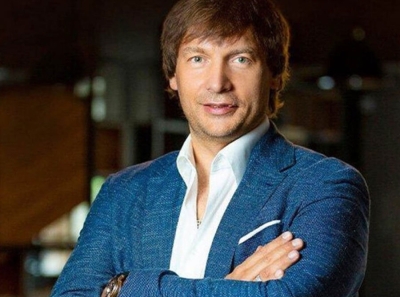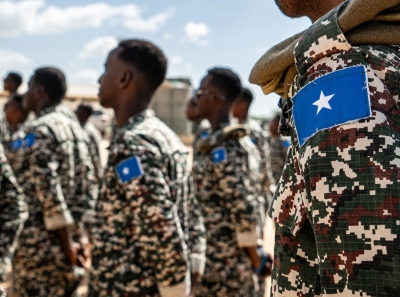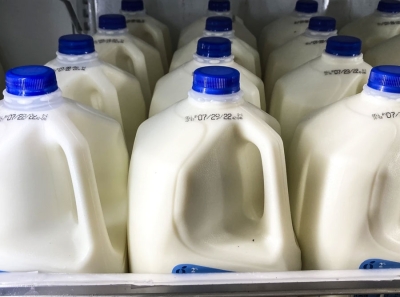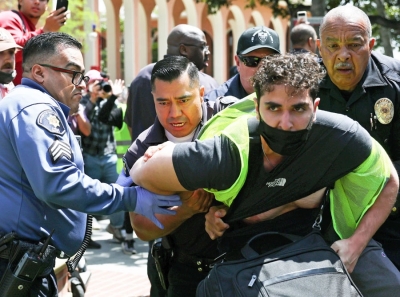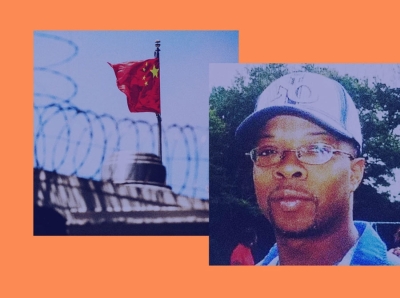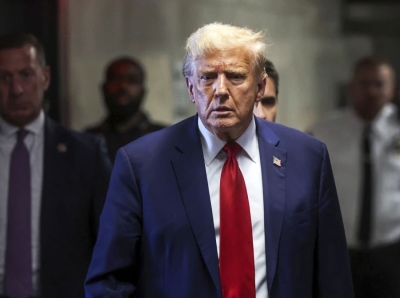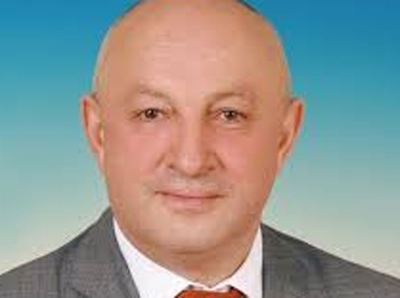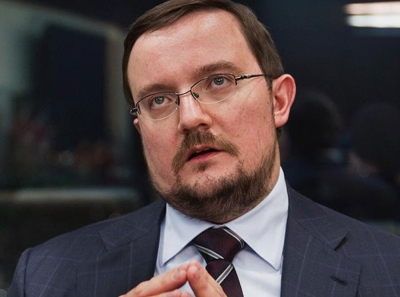Nato summit in Vilnius: what’s in store for Ukraine?
In the run-up to the Nato summit taking place on Tuesday and Wednesday in Vilnius, the big question remains when Ukraine will become a Nato member. While countries like Poland, the Baltic states, France and Ukraine itself are calling for the country be admitted as soon as the war ends, others like the US want to offer comprehensive security guarantees rather than swift accession.
Squaring the circle
Lidové noviny speculates about the summit’s final result on paper:
“Will it be the date of Ukraine’s accession to the Alliance? A firm promise that accession will take place after the war? A vague promise? Or not even that? ... The Nato summit must solve the problem of squaring the circle: how to give Ukraine at least some security guarantees while at the same time preventing the West from getting involved in a direct war with Russia? This is no trivial feat.”
Expect setback for Ukraine
Ukraine won’t receive an invitation to join Nato, security policy expert Karl-Heinz Kamp predicts in the Neue Zürcher Zeitung:
“Washington and many others point to the enormous costs that would be incurred if Nato wanted to defend Ukraine — the second-largest state in Europe after Russia — on its eastern border. So far Nato hasn’t even managed to permanently station enough forces on its existing borders in the east. The consensus in the alliance is that no invitation will be extended to Ukraine to join Nato in Vilnius.”
America still Europe’s life insurance
The US remains indispensable for European security, Handelsblatt notes:
“Left to their own devices, the Europeans, with their bonsai armies, would have little to counter the land-grabbing ambitions of Kremlin boss Vladimir Putin. Finland’s and Sweden’s decision to seek Nato’s protection demonstrates how sceptical Europeans are about their ability to defend themselves. The EU’s promise of assistance, written down in Article 47, paragraph 7 of the EU Treaty, does not inspire confidence in Helsinki or Stockholm. In an emergency only one thing counts: the US’s security guarantee . ... Nato is Europe’s life insurance — and America is Nato’s life insurance.”
Set limits to Beijing’s hunger for power
China must also be on the agenda at the summit, La Repubblica insists:
“The establishment of a geopolitical and security policy doctrine to effectively counter the growing self-confidence of the People’s Republic of China can no longer be postponed. The military threats against democratic China in Taiwan, the never-denied ‘alliance without borders’ signed by Xi and Putin shortly before the start of the conflict in Ukraine, the illegal occupation of large swathes of the South China Sea; ... the growing cooperation between China, Russia and Iran in the energy, technological and military sectors — these are the elements that characterise the new global challenge posed by Beijing.”
A clear decision is needed
The decision will say a lot about the state of Nato, writes Kauno diena:
“When it comes to membership, the focus is often solely on the military component, disregarding requirements — such as the level of democracy and respect for the rule of law. ... The Nato members’ decision on Ukraine will show whether international law, which the Russian leadership has trampled on, is still so important to them. ... A vague decision by the alliance that is open to interpretation, especially if it is announced in Vilnius, would be a gift to the Kremlin mob. Not least because of the idea that even in the post-Soviet space the stench of the long-defunct Warsaw Pact paralyses the will of the Western alliance.”
Prague should do what it can
Ukrainian President Zelensky also travelled to Prague as part of his European tour to promote his country’s Nato plans. Lidové noviny advises:
“Membership in the North Atlantic Alliance has been promised to Kyiv since 2008. But the country will not be admitted before the end of the current war, and who knows when afterwards. It’s not that the alliance doesn’t have any members who are caught up in territorial disputes or fighting wars. But a conflict with a nuclear power is a whole different kettle of fish. Getting involved would be unwise. And after the war? If Russia remains aggressive and strong, that will be a problem. On the other hand, Kyiv must at least receive individual security guarantees from the Nato countries. The Czech Republic should support this.”
Sweden also benefits as a de facto member
Sweden should remain relaxed in the face of the ongoing Turkish blockade, Dagens Nyheter believes:
“Turkey’s demands for extraditions and bans on Koran burnings cannot be met. Nor is that what the other Nato states expect of us. No one wants a situation in which Erdoğan blackmails potential members or the organisation as a whole. ... If everything is not yet settled next week, the government should focus its energy on facilitating the deepest possible military integration into the alliance — and on ensuring that we are treated as a de facto member until we receive formal membership. This will benefit both us and Nato.”
Send a strong message to Putin
Politiken also calls on Nato to ignore Erdoğan, but wants to see the neighbouring state in Nato at any cost:
“Strengthening the front against Russia is precisely what Nato’s heads of state and government are focused on. So of course they can neither give in to a diffuse Middle East rage [over Koran burnings] nor to Erdoğan’s concrete demands. If they did, the Nato states would have accepted the tyrant’s veto and the blackmailer’s methods, and it was precisely to combat such things that the defence alliance was formed. ... The strongest response to Putin at the moment will therefore be to renew this unity. And it could hardly be more symbolically beautiful if that happens on former Soviet territory in Vilnius, from which the Lithuanians liberated themselves in 1990.”
Accession the only viable security guarantee
Eesti Päevaleht is cautiously optimistic:
“Ukraine’s application for membership is clearly the most difficult issue. The goal is a concrete accession agenda, or in other words an answer to the question of how and under what conditions Ukraine can become a member of the Alliance. ... Ukraine will not be left empty-handed. Together, the member states are taking a number of practical steps to help Ukraine and also to strengthen its security. Estonia’s representatives at the summit, in particular Prime Minister Kaja Kallas, have been repeating for months that the only viable security guarantee is Nato.”
Careful with the conditions
Ukrainska Pravda calls in a joint editorial for swift Nato accession for Ukraine:
“The White House began repeating last year that it would help Ukraine ‘as long as it takes’. ... However, it turned out that the word ‘long’ in this phrase also stands for ‘slow’. ... It would be a huge mistake to think that Ukraine’s invitation to NATO can be postponed to the future as safely as the US delayed arms supplies. ... By stipulating certain security conditions for Ukraine’s invitation, the Alliance will signal to Russia that it must maintain a threat level higher than those conditions.”
Time to get a move on
Certain time factors could put Nato under extra pressure to invite Ukraine to join the alliance, The Times hopes:
“Nato has a maximum of one year to do so. Not only because it plans to celebrate its 75th birthday with due pomp in 2024, but also because next year’s summit in Washington could be Joe Biden’s last hurrah before Donald Trump possibly returns to the White House. Should that happen, Ukraine will no longer be able to rely on the currently still large Western military aid. ... So the Vilnius summit must go beyond mere self-congratulation and gather steam on accelerating Ukraine’s accession to Nato.”
Not as united as they would like to be
Der Tagesspiegel is not expecting the summit to be very harmonious:
“Turkey has been blocking Sweden’s accession for months under pretexts that have nothing to do with Nato. ... The alliance is also at odds over what it wants to offer Ukraine. It agrees that the country needs security guarantees. But it does not agree that it should receive an invitation to join. ... Whatever is ultimately decided as the lowest common denominator: the powerful signal of unity sent by the prompt agreement [to extend the mandate of Secretary General Jens Stoltenberg by another year] will probably be followed by the impression that Nato is not quite as united as it would like to be in view of the war in Europe.”
Ukraine would be a real asset
Verslo žinios appeals to the those who are sceptical about Ukraine joining the alliance:
“Some Western countries are reluctant to accept its membership after the war, apparently without having properly assessed the threat posed by Putin and Russia. ... Ukraine is not waiting for fine speeches, nor for vague promises, nor for if-then considerations that lead nowhere, but for substantive decisions. With a realistic timetable for accession, Nato would demonstrate true unity and strength. ... And the alliance would gain a brave, battle-hardened army equipped with modern Western technology. Nato’s 33rd member would become a reliable pillar against the predatory ambitions of its eastern neighbour.”
